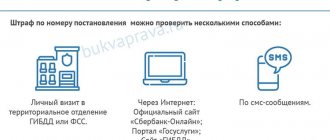Features of prosecution for theft
For theft, a person faces administrative or criminal punishment. The mildest punishment is a minor fine depending on the amount stolen and arrest for up to 15 days. The most severe punishment is a fine of 1 million rubles and 10 years of imprisonment.
The punishment for theft depends on many circumstances - the age of the thief, his financial situation, the subject of the crime, mental health.
The legislation establishes a number of aggravating circumstances that can transfer a case from administrative to criminal:
- The theft was not committed for the first time;
- a thief, breaking the law, broke into a residential apartment, storage facility (warehouses, storage areas, outbuildings), premises (office, building);
- the accused organized a group crime, the theft was planned and carried out by more than two people;
- the thief took something out of the victim’s bag and clothes;
- the accused caused major damage - at least 5 thousand rubles.
These factors increase the amount of the fine or the length of arrest/imprisonment, regardless of the scale of the crime.
Initiation and investigation of a criminal case regarding theft.
A criminal case for theft is initiated not only at the request of the victim. Such cases relate to cases of public prosecution (Article 20 of the Code of Criminal Procedure of the Russian Federation). Consequently, a case can be initiated not only on the basis of a statement from the victim, but also on the fact of theft, information about the commission of which could have been received by law enforcement agencies from other sources (confession, reports from witnesses, etc.).
Depending on the severity of the crime committed, the preliminary investigation is carried out in the form of a preliminary investigation or inquiry. During the investigation, the following operational investigative actions are carried out aimed at establishing the circumstances of the commission of a criminal act, establishing the identity of the perpetrator and securing evidence of his guilt. 1. The scene of the incident is inspected and the traces left at the scene of the incident are recorded (traces of sweat, fingerprints, shoe marks, signs of a break-in, etc.). CCTV footage is requested and confiscated. 2. The real value of the stolen property is determined to qualify the offense and exclude an administrative offense. 3. The owner or other person who legally owned the property that was removed from his possession as a result of a criminal act is determined. 4. The circle of witnesses and suspects is established. 5. The primary qualification of the offense is determined. 6. A search, detention and interrogation of the suspect is carried out. His alibi is checked. 7. The suspect is searched, his home and other places of possible storage are searched to identify traces of involvement in the crime. 8. The necessary examinations and confrontations are appointed and carried out. 9. The final charge is presented and the accused is given the right to familiarize himself with the investigation materials. After the preliminary investigation is completed, the indictment is approved by the prosecutor and the case is sent to court.
When responsibility comes
In accordance with Art. 2.3 of the Code of Administrative Offenses of the Russian Federation, a person who has reached the age of 16 at the time of the theft is subject to administrative liability.
If the theft was committed in a store by a minor, and this is not the first time the child has been caught doing this, then he may be sent to a correctional facility, and the parents will be required to pay a fine. The same thing awaits a child for committing robbery or robbery.
As for children under 16 years of age, in this case the matter may be limited to registering the child with the commission for minors. Authorized persons often issue a decision refusing to initiate a case.
Petty theft for an amount exceeding 2,500 rubles
Time does not stand still; inflation and general price increases determine the need to amend the rules on theft. Legal scholars have long been saying that acts should be classified as petty theft if the amount of damage reaches up to five thousand rubles.
At the moment, such changes to the legislation have not been adopted. However, it is expected that this will reduce the negative consequences for society. Quite often, in practice, the presence of a criminal conviction does not correct the guilty person, but returns him to an illegal path, whereas when applying administrative measures the situation is somewhat different.
If criminal liability began at five thousand rubles, many citizens would be able to receive an administrative punishment instead of a criminal one. This, in turn, could reduce the burden on the criminal system and positively affect the consequences for citizens.
Punishment for petty theft
Up to what amount of shoplifting entails an administrative penalty? The matter concerns a small amount.
Petty theft is the theft of someone else's property in the amount of up to 1000 rubles. If the amount of the stolen goods does not exceed 1 thousand rubles, then in the absence of aggravating factors, the offender may be required to return the value of the stolen goods 5 times or be arrested for up to 15 days.
If the amount of the stolen goods is 1-2.5 thousand rubles, then the person can be forced to perform correctional labor for up to 5 days, arrested for up to 15 days, or fined in the amount of 3 thousand rubles to 5 times the value of the property.
The purchase price of the goods, without markups, is taken into account, and not the store price.
If a thief, for example, tried to take goods out of a store, but was detained by a security guard at the entrance and returned what he had taken, then this offense becomes only an attempted theft. If the thief has already left the supermarket, then this action becomes a complete theft.
If aggravating factors are identified, the punishment becomes criminal rather than administrative, and can be expressed in the following forms:
- fine up to 200 thousand rubles;
- the prisoner's salary for one and a half years;
- imprisonment up to 5 years;
- correctional labor for up to 2 years;
- compulsory work lasting up to 480 hours.
The amount stolen no longer matters.
Since 2021, Article 158.1 has been added to the Criminal Code of the Russian Federation. In accordance with it, if within 12 months from the date of receiving an administrative punishment a thief commits petty theft again, then he will face criminal liability.
Statement to the police about theft of property, sample from an individual or legal entity
What is damage, the concept of significant damage
First, let's look at the very concept of “damage”. These are those disadvantageous property consequences for the victim that occur as a result of the crime. They can be expressed both in a decrease in property assets and in a missed opportunity to obtain any benefit.
Damage is divided into two types:
- material (it is applied to property and funds of a legal entity or individual);
- moral (it is expressed in moral or even physical suffering, as well as in humiliation of a person’s dignity and honor).
Damage has two types - material and moral.
There are also three types of damage:
- significant;
- large;
- especially large.
Important! It is worth immediately noting that they are expressed in monetary terms, but do not have any unified system of legally defined amounts. It all depends on the offense itself, its type and the consequences that resulted from it.
What is significant damage under the Criminal Code of the Russian Federation? If we talk about an individual, then, according to Note 2 to Art. 158 of the Criminal Code of the Russian Federation (“Theft”), it is defined as an amount of at least 5,000 rubles.
This means that if the harm was assessed at a different amount, then it will be a minor damage, which means that the crime will no longer be considered criminal, and the offender will most likely bear administrative liability.
Reference. According to Art. 159 of the Criminal Code of the Russian Federation (“Fraud”), the amount of significant damage is 10,000 rubles.
As for those situations where this type of damage was caused to a legal entity, state or individual entrepreneur, you will not find a clear definition in the legislation. A huge number of factors are taken into account when assessing it. For example, these include:
- the price of destroyed or damaged property, as well as their restoration;
- their significance for the victim;
- the type of his activity;
- his financial condition;
- property status and so on.
Significant damage helps in assessing the severity of the crime committed.
All of the listed criteria help determine how much significant damage this is under the Criminal Code of the Russian Federation in each individual situation. After all, any offense is individual in its essence, which means it is necessary to apply a differentiated approach to determining the degree of harm caused.
Punishment for grand and especially grand theft
Grand theft - theft of property in the amount of 250 thousand to 1 million rubles.
are provided for grand theft :
- imprisonment for up to 6 years;
- a fine of 100 to 500 thousand rubles or in the amount of the convicted person’s earnings for up to 5 years.
Particularly large theft - theft of property worth more than 1 million rubles.
Possible legal consequences:
- imprisonment up to 10 years;
- a fine of up to 1 million rubles (or in the amount of the thief’s earnings for up to 5 years);
- restriction of freedom for a 5-year period.
The presence of aggravating factors is important.
How is damage caused calculated?
To determine the specific amount of damage, you cannot do without experts. They are attracted both by law enforcement agencies and by the victims themselves. This study helps resolve all disputes and disagreements regarding the value of stolen property. Bank card fraud deserves special attention.
If the victim still has receipts from the purchase, he can provide them as proof of his expenses. In this case, you must always take into account the time of use, since there are concepts of wear and tear.
For example, a phone purchased several years ago for 40,000 rubles costs significantly less at the time of the fraud. Then the amount claimed for compensation is calculated based on a market analysis of similar used goods.
Punishment for Internet theft
Theft is often associated with fraud. The most common option is theft of money from a bank card or account.
If a thief hacks a card or account, then this crime is classified as theft. If the card/account owner himself gave the details to the attacker as a result of deception, then this crime becomes a fraud.
Theft of funds from a bank account acts as an aggravating circumstance. The amount stolen does not matter - the thief will be prosecuted.
Breaking
The law does not contain the concept of hacking. However, such a concept exists in forensic science, which helps to search for and record traces of a crime at the scene of its commission.
Forensic scientists understand burglary as entering a premises to which access is limited, overcoming barriers. For example, by damaging or destroying the locking device, walls, doors, windows, etc.
In forensic science, burglary is also considered penetration without causing damage to these barriers. For example, opening a lock with a master key, picking up keys or other objects.
Hacking is just a way for a criminal to get to stolen property. By itself, it is taken into account in the elements of theft or other thefts only in situations specified by the Criminal Code, as an aggravating circumstance entailing more stringent liability.
Arbitrage practice
In June 2021, a college student in the Tver region was sentenced to 100 hours of compulsory labor under Part 1 of Art. 167 of the Criminal Code of the Russian Federation for stealing boxes of chewing gum from a cafe. The owner of the cafe received damage worth 453 rubles and identified the thief through surveillance cameras. The tougher punishment was established due to the fact that the student had previously been subject to administrative punishment for petty theft and was tried for intentional damage to someone else's property.
A similar incident occurred in one of the Kopeisk chain stores. The woman stole household chemicals and food worth 1,866 rubles, and this was not the first time she had committed such thefts. In 2019, a woman was detained for theft from a store with damage up to 2,500 rubles - for which she received a fine of 3 thousand rubles. Within a year, she committed repeated petty theft, in connection with which a criminal case was opened. Punishment – imprisonment for up to 1 year.
In May 2021, in Krasnodar, a store merchandiser stole an impressive amount of money from the cash register - 80 thousand rubles. Law enforcement agencies examined surveillance cameras and determined that the thief was a 40-year-old local resident who had not previously been brought to justice. The woman explained her action by the need for money for treatment of a relative. She faces up to 5 years in prison.
What else can be called burglary?
Not in a legal environment, burglary can be called acts falling under Art. 161 of the Criminal Code of the Russian Federation “Robbery” and Art. 162 of the Criminal Code of the Russian Federation “Robbery”.
The difference with theft is as follows:
- Robbery is the open theft of property.
- Robbery is an attack with the aim of stealing property.
The specified norms provide for much more tangible liability for these crimes involving unlawful entry into a storage facility or home.
You will have to answer for robbery with penetration under paragraph “c” of Part 2 of Article 161 of the Criminal Code of the Russian Federation. It is realistic to receive up to five years of forced labor or up to seven years of imprisonment.
Robbery with penetration is punishable by the third part of Article 162 of the Criminal Code of the Russian Federation, for which the offender can be imprisoned for a term ranging from 7 to 12 years. For these acts, an additional fine or restriction of freedom may be imposed.
Did the article help you?
Not really









